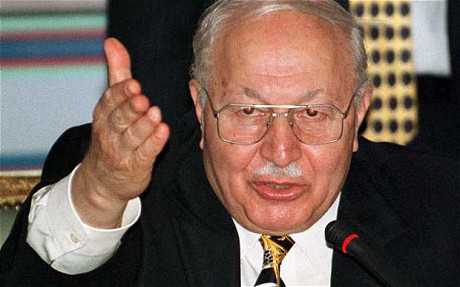Necmettin Erbakan, the former Turkish prime minister who died on February 27 aged 84, was his country’s most prominent Islamic politician, and an intellectual father to many key figures in the dominant party of the last decade, the incumbent AKP.
6:29PM BST 10 Apr 2011

But to the end of his life Erbakan espoused a much-less pragmatic version of political Islam that current Prime Minister Tayyip Erdogan and President Abdullah Gul, who were eventually forced to split from their one-time mentor. As a result, by the time of his death Erbakan held a position only at the periphery of Turkish politics, as leader of the inconsequential Felicity [Saadet] Party, which does not hold a single seat in the current parliament.
Necmettin Erbakan was born in Sinop, northern Turkey, on the national day, October 29, in 1926. As a student at Istanbul Technical University (ITU) he won a reputation as a talented scholar earning the epithet of hoca or “teacher”. At university he was a contemporary and friend of the future Turkish president, Suleyman Demirel, with whom he was to form a coalition in the Seventies.
In the early 1950s Erbakan completed a PhD in Mechanical Engineering at Aachen University in Germany, where he ended up helping to design parts for the Leopard tank. The prejudice experienced by Turkish migrant workers in Germany at this time had a strong influence on his politics, and particularly on his suspicious stance towards the West.
He returned to teach at ITU, and only entered politics in 1969, when he published Milli Gorus or “National Perspective”, a manifesto for a nationalistic brand of Islamic politics. It was fuelled by the sense of marginalisation that he had felt in Germany, a sentiment that would go on to fire all his parties – he founded five, of which four were closed down for deviating from the strict secularism that is enshrined in Turkish constitution.
Erbakan’s political career began to blossom in the 1970s, but his rise was cut short in 1980, when he was one of many politicians (of all persuasions) who was banned from political life after the military coup of that year.
He returned to politics in 1987 and eight years later found himself the Turkish Republic’s first overtly Islamic prime minister. His promotion to this position was largely due to fortune. A fallout between two major parties following 1995 elections propelled his Welfare Party, which had polled 21 per cent of the vote, to power.
As prime minister he soon shocked the secular establishment with talk of alliance with the Arab world, and with his overt disdain for Turkey’s ongoing project of accession to the European Union. While existing protocol dictated that his first major visit should be to Washington, Erbakan flouted the advice of his foreign ministry and flew instead to Tehran, where he made an expensive deal to import gas from Iran. He later attracted criticism for attempting to relax the ban on government employees wearing headscarves, and for entertaining the heads of religious groups in his residence at Ankara.
The military, as self-styled guardians of the secular character of the Turkish state, eventually managed to oust him in 1997. In contrast to the use of tanks of previous coups, however, this was effected through security memorandums strenuously advising the government to curb its “anti-constitutional” activities, as well as through pressure on politicians in Erbakan’s junior coalition partner. As Erbakan was levered gently from power, the military’s tactics were dubbed a “postmodern” coup.
Erbakan was a man of many eccentricities, not all of them benign. A Versace-wearing Islamist, he unsuccessfully contested the closure, in 1998, of the Welfare Party at the European Court of Human Rights, apparently impervious to the irony that he was fighting the closure of his nationalistic party by appealing to the European sense of fair play. He also had an unlikely friendship with Jean Marie le Pen. This obeyed a curious logic, the two men seeming to reassure one another that the two civilisations they represented were forever incompatible.
There was also a touch of the egomaniac about Erbakan. The articulate politician Numan Kurtulmus recently stood successfully for the leadership of Erbakan’s last political party, Saadet. Though Erbakan was then an octogenarian in poor health, he appeared to engineer his successor out of the party so that he could again assume control himself. Kurtulmus was driven to announce his resignation following a Ramadan dinner at which knives and forks were thrown at him by the Erbakan faction. Significantly, though, Erbakan’s followers were never called to rise to any greater display of violence than this.
Despite these faults Necmettin Erbakan did prove that an Islamic party could get elected in Turkey, and function within a democratic framework. But his isolationist attitudes did not sit well with the upwardly mobile aspirations of many voters. Both of these facts were recognised by Erdogan and Gul, who split from Erbakan to form, in 2001, the AK Party, which has proved unstoppable ever since.
Necmettin Erbakan is survived by two daughters and a son.
via Necmettin Erbakan – Telegraph.